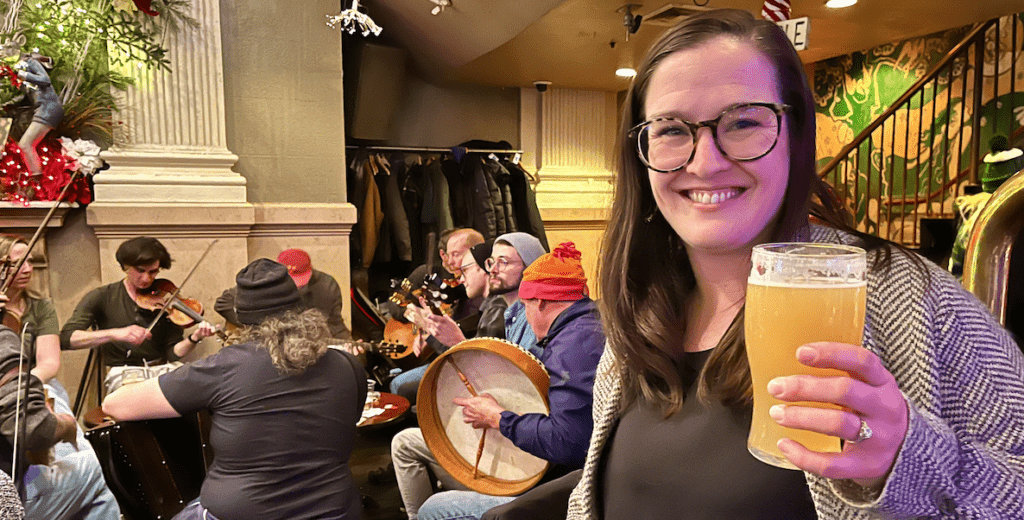A rowdy Irish pub fell to silence when Rosaleen McGill started singing:
Come all you maidens young and fair
All you that are blooming in your prime
Always beware and keep your garden fair
Let no man steal away your thyme.
It was a moment of lamentation amid the latest weekly lively music session: McGill is one of the many singers, drummers and string players who have shown up to The Plough & The Stars every Sunday over the last two decades to play traditional Irish songs.
McGill, a 37-year-old native Philadelphian whose father hails from County Donegal, first performed at The Plough when she was 17 years old. On a recent Sunday she sat at the bar eating shepherd’s pie while waiting her turn to show off some well-practiced sean-nós vocals — an Irish term that translates to “the old way.”
The style is melismatic in nature, meaning its flair and feeling come from stretching each syllable to contain a riff of musical notes. “I call it socially acceptable yelling,” McGill said of her own folky croon. “I’m channeling the grief of my ancestors.”
Between racing jigs and soaring airs, those huddled beside the venue’s bar bowing fiddles and beating bodhráns (Irish frame drums) offer their own quips. They call those moments “crack,” which this raised-eyebrow reviewer discovered is jargon for old fashioned “fun” over in Ireland.
Only two people are paid to lead the weekly public gig at the Plough. The rest are family, friends and Irish-curious strangers who show up to practice their gifts of gab just as much as to make music.
While I tried to tap into my roots by chugging a lukewarm Irish coffee in the corner, McGill was busy making the rounds, hugging familiar faces (I couldn’t count how many of the musicians she referred to as cousins) and dodging the hills and valleys of arms passing back pints of Guinness. At first I felt like a voyeur. But it didn’t take long before the Bailey’s wrapped me into an Irish American cliché. Soon I was basking in the embrace of McGill’s dulcet balladry.
As the youngest of six kids growing up, McGill has always had to project to be heard. It’s a necessary skill to maintain when your usual audience is a bunch of boisterous men drunkenly indulging in Sunday football.
But as a member of local bar culture that sometimes hosts as many as 40 musicians in a weekend set, she’s also found that etiquette overrides anarchy. The number one rule is “It’s okay not to play,” McGill explained. “This is an informal group, but it’s not a free-for-all.”
Philadelphia is probably the most hospitable city when it comes to hosting Irish song sessions, McGill and company reflected. Other cities — take, for instance, Boston — can be “cutthroat” about who gets to play. “Sometimes it’s a lot of young guys competing for the hearts of women,” McGill noted with a laugh. They need a reminder, she said: “This is not a race.”
In Philly, it’s an educational experience. If you don’t know the tune, listen and learn before you chime in. Everyone gets a chance to pitch in and play their part so long as they’re patient. If not, there’s always the opportunity to get kicked out on your coattails, like any other drunkenly unaware bar room patron.
While a lot of knowledge comes from weekly participation, other notes of cultural understanding can arrive only through the passage of time.
Take, for example, McGill’s favorite melody, “Bunch of Thyme,” which she sang Sunday.
“I didn’t know what it was about as a kid,” she said. “Then one day, I realized: This isn’t about gardening. This is definitely about getting pregnant.”
There was a moment of transcendence as McGill concluded her verse. It didn’t matter that the Eagles were on the flat screen. A hush soared through the crowded room as McGill’s energy spread its wings:
Once she had a bunch of thyme
She thought it never would decay
Then came a lusty sailor who chanced to pass her way
He stole her bunch of thyme away
The sailor gave to her a rose
A rose that never would decay
He gave it to her to keep her reminded
Of when he stole her thyme away.
A dissonant duet emerged when one audience member broke etiquette to join in; the shrill cry of a baby punctuated the poem.
The Plough hosts live Irish music sessions every Sunday from 4 to 8pm at 123 Chestnut Street.
Nora Grace-Flood is the bureau chief for Midbrow Philly. She was previously a staff reporter at the New Haven Independent covering homelessness, land use and municipal politics as well as a corps member with Report for America.
Midbrow is an initiative of the nonprofit Online Journalism Project. It aims to seed a network of writers in cities across the country to review in-person local arts and cultural events. Access free, multimedia reporting on your city’s local arts scene by checking out their homepage or signing up to receive the Philly Midbrow newsletter directly to your inbox.



